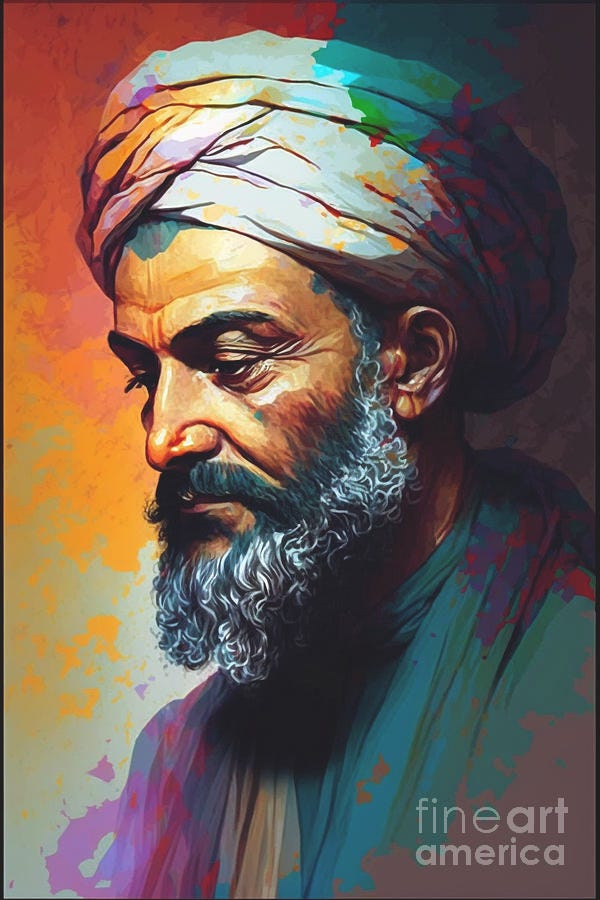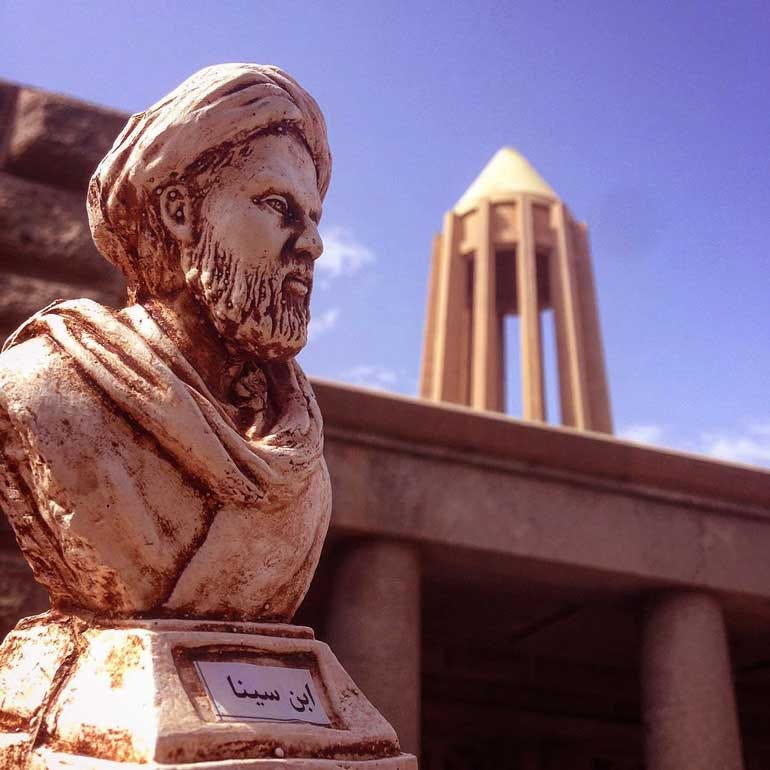Do you know 'AviCenna' the father of modern medicine?
Who benefits from the exclusion, ignorance and suppression of true genius?
Ibn Sina by Asfandyar Hesami
I created this Substack on Ibn Sena (latinised to Avicenna) because even reasonably open, wise and well-read people don’t seem to know who he - and others like him - are. This can be astonishing, but I also see it as an opportunity to share what I know and discover what can be found.
At best, a lack of awareness may be because people are not exposed to the full spectrum of our fascinating world, or, they are afraid to explore knowledge outside of what they are taught. At worst, it is attributed to self-bias, rigidity, territory control, and intellectual arrogance.
Why Ibn Sina and others like him are erased by learning and media institutions can be attributed to discrimination, cultural exceptionalism, economic monopoly, and the obsessive promotion of Big Pharma - Rockefeller ‘medicine’ over all else that is good for us as humans.
The censorship of knowledge harms us all. Throwing a light on beneficial knowledge is a beautiful and important role. It is one that should be embraced for the sake of all humanity. I hope you agree and I look forward to learning more from you on our journey to freedom.
Introduction
“Avicenna also known as Ibn Sina, was a Persian polymath who lived from 980 to 1037 CE. He is considered one of the most influential thinkers in the Islamic Golden Age and among the most important philosophers and physicians of the Middle Ages who made significant contributions to the fields of philosophy, medicine, and science.
Avicenna was born in the city of Bukhara, in present-day Uzbekistan. He displayed exceptional intellectual abilities from a young age and quickly gained a reputation as a prodigious scholar. Avicenna received a comprehensive education in various disciplines, including medicine, mathematics, physics, philosophy, and Islamic theology.
Contributions to Philosophy
Avicenna's most renowned philosophical work is his magnum opus, "The Book of Healing" ("Al-Shifa"). In this extensive philosophical treatise, Avicenna synthesized various philosophical schools, including Aristotle's teachings and Neoplatonic ideas, and integrated them into an Islamic framework. The book covers a wide range of topics, including metaphysics, ethics, psychology, logic, and the philosophy of science. Avicenna's philosophical ideas, particularly his metaphysical theories, had a profound influence on both Islamic and Western philosophy.
Contributions to Medicine
Avicenna is often referred to as the "Father of Modern Medicine" for his significant contributions to medical knowledge and practice. His monumental medical encyclopedia, "The Canon of Medicine" ("Al-Qanun fi al-Tibb"), became a seminal text in the field for amny centuries. It is a comprehensive work that covers various aspects of medicine, including anatomy, physiology, pathology, pharmacology, and medical ethics. The Canon of Medicine served as a standard medical textbook in Europe and the Islamic world for centuries and played a crucial role in advancing medical knowledge during the Middle Ages where it was a standard text at Universities such as Montpellier.
Avicenna's contributions to medicine extended beyond his writings. He made important breakthroughs in the diagnosis and treatment of various diseases, introducing new medical techniques and refining existing practices. Avicenna's approach to medicine emphasized the importance of observation, experimentation, and the holistic treatment of patients.
Contributions to Science
Avicenna's contributions to science were wide-ranging and encompassed disciplines such as physics, astronomy, mathematics, and natural philosophy. He expanded on the Aristotelian and Ptolemaic scientific traditions and made significant advancements in areas such as optics and the study of motion. Avicenna's works on physics and astronomy influenced later scientists, including European scholars during the Renaissance.
Avicenna's innovative methods of experimentation and observation helped lay the foundation for the scientific method. He emphasized the importance of empirical evidence and logical reasoning in scientific inquiry, setting the stage for the development of modern scientific practices.
Overall, Avicenna's intellectual legacy is vast and enduring. His contributions to philosophy, medicine, and science shaped the course of intellectual history and had a profound impact on subsequent generations of scholars.”
Source unknown
Did you know Ibn Sina before reading this Substack?
No I did not learn about him
I knew a little but now I know more
59 VOTES ·
Learn more
Tribute to Ibn Sena:https://observervoice.com/22-june-tribute-to-ibn-sina-28091/
Baghdad was centre of the scientific world https://www.theguardian.com/books/2010/sep/26/baghdad-centre-of-scientific-world
Lost History: The Enduring Legacy of Muslim Scientists, Thinkers, and Artists https://www.goodreads.com/en/book/show/1258331




No comments:
Post a Comment